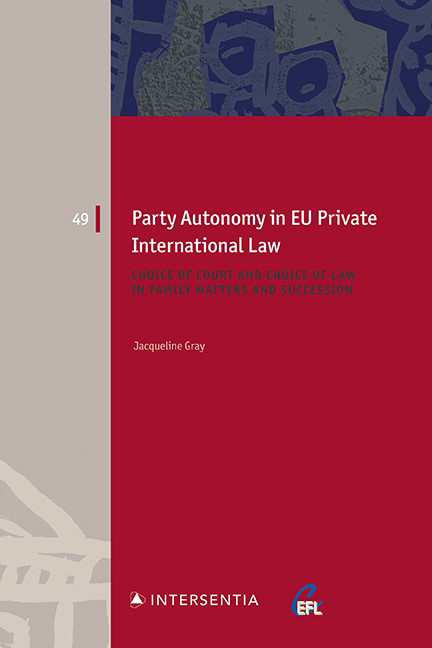 Party Autonomy in EU Private International Law
Party Autonomy in EU Private International Law Published online by Cambridge University Press: 25 May 2021
INTRODUCTION
Having established the subject matter and focus of choice of court and choice of law agreements in the EU‘s private international law rules relating to family matters and succession, the central point of this investigation comes to the fore: the ‘connections‘ between parties and their choice of court or choice of law through which party autonomy can be exercised.
This chapter will represent the first stage in carrying out the presentation, examination and evaluation of the connecting factors through which a choice can be manifested in the present context by looking at the criteria available to be directly chosen. It is one of three chapters on the content of choice, with the other two chapters addressing choice of court or choice of law provisions that operate through coordination (‘coordinating provisions‘) and the jurisdictional mechanisms that include a residual element of party autonomy that is subsidiary to a primary function (and‘subsidiary choice of court provisions‘).
The chapter will describe, examine and evaluate the direct connections that are made available in the EU‘s unified private international law rules concerning family matters and succession, namely: habitual residence (6.2.); nationality/domicile (6.3.); and the place where a relationship was created (6.4.).
A synthesis will be presented at the end of this chapter (6.5.), which will bring together the findings in the same format as has been used in Chapters 3 and 4. As well as considering the functions of the particular connections, particular regard will be given to the breadth of choice that is observed within and between the various areas, as well as the role of the parties in selecting a particular connection.
HABITUAL RESIDENCE
This section begins with the most prominent connecting factor currently found within the EU private international law framework on family matters and succession: habitual residence. The following series of subsections analyse this criterion by exploring its general characteristics (6.2.1.), before examining and contrasting its manifestations in both the choice of court (6.2.2.) and choice of law (6.2.3.) provisions in the relevant instruments.
To save this book to your Kindle, first ensure [email protected] is added to your Approved Personal Document E-mail List under your Personal Document Settings on the Manage Your Content and Devices page of your Amazon account. Then enter the ‘name’ part of your Kindle email address below. Find out more about saving to your Kindle.
Note you can select to save to either the @free.kindle.com or @kindle.com variations. ‘@free.kindle.com’ emails are free but can only be saved to your device when it is connected to wi-fi. ‘@kindle.com’ emails can be delivered even when you are not connected to wi-fi, but note that service fees apply.
Find out more about the Kindle Personal Document Service.
To save content items to your account, please confirm that you agree to abide by our usage policies. If this is the first time you use this feature, you will be asked to authorise Cambridge Core to connect with your account. Find out more about saving content to Dropbox.
To save content items to your account, please confirm that you agree to abide by our usage policies. If this is the first time you use this feature, you will be asked to authorise Cambridge Core to connect with your account. Find out more about saving content to Google Drive.